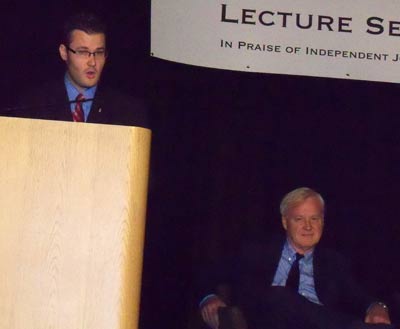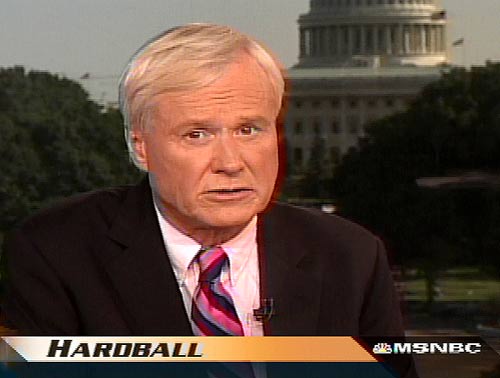USU essayists tackle Chris Matthews, pundits to win statewide contest
November 1st, 2011 Posted in OpinionBy Ted Pease
SALT LAKE CITY—Are pundits and political commentators “the ultimate independent journalists”? Two Aggie writers topped 128 other Utah college students to take the top two spots in a statewide essay contest to answer this question.
Their resounding “NO!” startled the guest of honor at the annual McCarthey Family Foundation Lecture, “In Praise of Independent Journalism,” at the University of Utah on Saturday, but MSNBC Hardball host Chris Matthews was unfazed.
 USU teacher education major Stephen Worthington of Cedar City won the statewide contest—and its $2,500 prize—along with the honor of reading his essay before Matthews and an audience of about 700 at Rowland Hall on the U’s south campus.
USU teacher education major Stephen Worthington of Cedar City won the statewide contest—and its $2,500 prize—along with the honor of reading his essay before Matthews and an audience of about 700 at Rowland Hall on the U’s south campus.
• Read Stephen Worthington’s winning essay on punditry.
“A political pundit is not ‘the ultimate independent journalist,’” Worthington said, eliciting a sharp look from Matthews, seated behind him on the stage. “In fact, punditry as currently practiced in the United States is not even journalism.”
Worthington was one of about 130 Utah college and university students who wrote 500-word essays addressing the question of pundits and independent journalism as part of this year’s event sponsored by the McCarthey Family, former owners of The Salt Lake Tribune.
“Punditry in the United States is ideologically driven,” Worthington wrote. “The primary objective of most pundits is to increase the number or devotion of their followers by appealing to their audience’s extant emotions and beliefs.
“In effect,” Worthington said, “‘pundit’ has become synonymous with ‘demagogue.’”
Worthington’s essay was selected as the winner by a panel of journalists and McCarthey family members.
“I was quite nervous when the time came to read my essay to hundreds of people, with a prominent pundit seated a few feet away from me,” said Worthington, who admits to being “a bit of a news junkie” with strong opinions about journalism. “Fortunately, Mr. Matthews took my judgments in stride.”
The second-place essay contest winner was journalism major Max Parker Dahl, who, like Worthington, argued that pundits aren’t journalists. In his essay, Dahl likened media pundits to professional wrestlers—entertaining but not real.
“Pundits work to polarize partisan views and negate/obliterate the possibility for common ground,” Dahl wrote. “The guests they invite are as calculated as a top-rope body-slam.”
• Read Max Parker Dahl’s essay.
But Dahl doesn’t blame pundits, who he says serve an important function as social commentators. But citizens shouldn’t depend on entertainers to tell them what and how to think, he said.
“The ultimate independent journalist will need to become each of us as we contribute from our backpacks the facts and photos of life as it unfolds around us,” he concluded. “Without personal contribution, we fall victim of someone else’s interpretation of what reality should mean to us.”
 For his part, Matthews agrees with the critical need for an independent press, and thinks he fulfills professional expectations as both a journalist and as an informed commentator.
For his part, Matthews agrees with the critical need for an independent press, and thinks he fulfills professional expectations as both a journalist and as an informed commentator.
• HEAR IT NOW: Chris Matthews talks with KCPW about journalism and politics.
“I think in my case I compare it to a . . . newspaper where during the day it’s straight news reporting and at night it’s opinion,” he told Salt Lake radio station KCPW. “I’m an opinion journalist, and I have pretty wide latitude.”
Matthews says he doesn’t see any conflict between his fact-based and opinion-based roles.
“I think the differences are pretty well codified,” he said. “You can’t have anything to do, if you’re a journalist, with a political institution or party or person. You have to have no intereste in their victory or success personally. You can have a philosophical interest, but you can’t have any role to play with them. I’ve always honored that.
It’s very important to me,” he added. “A lot of people don’t quite get that: You can root for candidates, you can believe in what they stand for, but you also have to be fact-based about what they’re actually doing and critical when they violate what you believe to be the right policy.”
Philip McCarthey, an officer in the foundation that sponsors the annual discussion of independent journalism, said the conversations spawned by Matthews’ lecture and the statewide essay contest about the role of journalism are essential.
“One of the great challenges in society . . . [is that] we should disagree about a number of things,” McCarthey said, “without being so disagreeable.”
TP
Tags: Chris Matthews, journalism, Max Parker Dahl, McCarthey Family Foundation, pundits, Stephen Worthington

2 Trackback(s)
Sorry, comments for this entry are closed at this time.